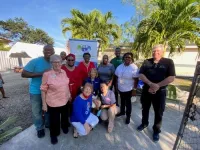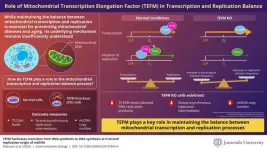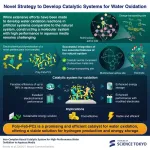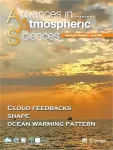(Press-News.org) The Aligning Science Across Parkinson’s (ASAP) initiative opened applications for research community members to apply for funding to develop novel tools to advance Parkinson’s disease (PD) research. The Collaborative Research Network (CRN) 2025 Technical Track grants will support the development of sustainable tools to accelerate validation and therapeutic research and discovery for emerging targets identified through ASAP discoveries, offering funding of up to $2M per year over three years, up to $6M total.
"By bringing researchers together to generate new preclinical tools for targets studied in our ASAP programs, our goal is to help accelerate discovery and research outcomes for Parkinson’s disease,” said Sonya Dumanis, PhD, deputy director of ASAP. “This funding opportunity builds on the Collaborative Research Network's collective efforts to grow our understanding of Parkinson’s disease through collaboration, resource generation, and data sharing."
Projects supported within the Technical Track will consist of three key components: tool generation, validation, and distribution for at least five eligible targets identified through ASAP discoveries. In addition, teams must adhere to the ASAP team composition, application, and budgetary guidelines while committing to follow ASAP’s Open Science Policy. Letter of Intent submissions are due on May 5, 2025, at 6pm ET. ASAP will announce funding decisions in February 2026.
Tools for emerging targets could include the following areas of focus:
Generation of preclinical models to support in vivo or in vitro assessments of targets of interest
Generation of detection reagents such as antibodies, nanobodies, or probes to support improved measurement or visualization of the target or target activity
Generation of modulation agents such as viral vectors, compounds, or antisense oligonucleotides to understand the directionality of therapeutic benefit for PD
Teams within the Technical Track will join the ASAP CRN, an international, multidisciplinary, and multi-institutional network of collaborating investigators working to address high-priority research questions.
Learn more about the funding opportunity, access the Letter of Intent (LOI) instructions, and view all requirements by visiting https://parkinsonsroadmap.org/funding-opportunities/technical-track/#
About
Aligning Science Across Parkinson’s is a research initiative comprised of international, multidisciplinary, and multi-institutional researchers working to address resource and knowledge gaps in the development and progression of Parkinson’s disease. ASAP is deeply rooted in the belief that we can accelerate advances by fostering a collaborative and open approach to research. ASAP is managed by the Coalition for Aligning Science and is working with The Michael J. Fox Foundation to implement its programs. For more information, visit our website and connect with us on LinkedIn and Bluesky.
Contact:
Rosanna Vierra, GMMB
rosanna.vierra@gmmb.com
808.215.1173
END
Aligning Science Across Parkinson’s (ASAP) launches a second funding opportunity to accelerate novel tool development to advance Parkinson's disease research
2025-03-05
ELSE PRESS RELEASES FROM THIS DATE:
New study: Eating mangos daily shown to improve insulin sensitivity and blood glucose control
2025-03-05
ORLANDO, Fla. – Mar. 5 2025 – New research has uncovered a potential gamechanger for improving cardiometabolic health: fresh mangos. A study recently published in the journal Nutrients finds that eating two cups of mango, just about 100 calories-worth, daily may help lower insulin concentration levels and improve insulin sensitivity in adults who are overweight or obese with chronic low-grade inflammation. The findings underscore how simple dietary choices could contribute to reducing the risk of chronic conditions like type 2 diabetes, ...
Highly radioactive nuclear waste – how to keep it from oblivion
2025-03-05
Sweden’s radioactive nuclear waste will be stored in a sealed bedrock repository for 100,000 years. It will be hazardous for a very long time. So how can we ensure that humanity does not forget that it is there? Researchers at Linköping University, Sweden, have come up with a proposal for how to keep the memory alive over generations.
“We’re trying to do something that no one has ever done before. The person who eventually reads this might not even be human, but perhaps a kind of AI or something ...
Generations ‘sync’ up in rural ‘glades’ to boost technology use for health
2025-03-05
Given the growing role of mobile technology in supporting older adults, it’s essential to implement initiatives that encourage its adoption among this population. However, older adults are often unfamiliar with mobile technology, especially those in rural areas with limited digital access or literacy.
To bridge this gap, researchers from Florida Atlantic University’s Christine E. Lynn College of Nursing, and collaborators, implemented a pilot study to test an intergenerational program involving high school students, older adults and local faith-based health educators in the “Glades,” a rural community nestled at the ...
Unveiling the mechanism of maintenance of replication and transcription in mitochondria
2025-03-05
Mitochondrial deoxyribonucleic acid (mtDNA) is essential for cellular energy production and overall cell function. Abnormalities in mtDNA are linked to various diseases and are also implicated in aging. Understanding the process of replication and transcription of mtDNA is crucial for improving our knowledge of human health, disease, and aging. However, the mechanisms that regulate the balance between transcription and replication of mtDNA remain unclear.
To unveil the mechanisms, a team of researchers ...
Pioneering research into brain cancer is awarded the world’s largest brain research prize, The Brain Prize
2025-03-05
Gliomas are types of cancers that arise in the brain and are extraordinarily difficult to treat. They are the leading cause of brain tumour-related deaths in both children and adults. Two pioneering scientists are awarded The Brain Prize 2025 for their discoveries that open up an entirely new way of thinking about and understanding these lethal diseases, and the potential strategies to treat them.
Copenhagen, Denmark, March 5th, 2025. Neuroscientists, Professors Michelle Monje (USA) and Frank Winkler (Germany), have made transformative discoveries by showing that neural ...
Concrete evidence: Japanese buildings absorb 14% of cement production's carbon footprint
2025-03-05
A team of Japanese researchers has discovered that Japan’s concrete structures—including buildings and infrastructure—absorb and store about 14% of the carbon dioxide (CO2) emissions generated during cement production.
This research provides vital knowledge to offset CO2 emissions from cement production, a significant contributor to global carbon emissions at approximately 8%. The study was published in the Journal of Cleaner Production.
With the growing urgency of climate change, scientists are focusing not only on reducing ...
New study examines how physics students perceive recognition
2025-03-05
ITHACA, N.Y. – Experts see peer recognition as important to student success in physics, and a new study gives college-level physics instructors insight into how students perceive the message from their classmates that “you’re good at physics.”
Even when women receive similar amounts of recognition from peers as men for excelling in physics classes, they perceive significantly less peer recognition, the researchers found. “Men are internalizing their recognition differently than women,” said Natasha Holmes, professor of physics at Cornell University.
Holmes ...
For some, childhood adversity can promote resilience to anxiety disorders
2025-03-05
New Haven, Conn. — Research has shown that young people who face adversity such as traumatic or stressful events during brain development are 40% more likely to develop anxiety disorders by adulthood. But most people who endure these experiences during childhood and adolescence prove to be resilient to these mental health effects.
A new Yale study finds that when this adversity occurs during brain development may affect how susceptible people are to anxiety and other psychiatric problems as adults.
According to the study, published March 5 in the journal Communications Psychology, ...
A sustainable iron catalyst for water oxidation in renewable energy
2025-03-05
A newly developed pentanuclear iron complex (Fe5-PCz(ClO₄)₃) can offer an efficient, stable, and cost-effective solution for water oxidation. By electrochemically polymerizing the complex, researchers from Institute of Science Tokyo obtained a polymer-based catalyst, poly-Fe5-PCz, and achieved water oxidation with up to 99% Faradaic efficiency and exceptional stability, even under rigorous conditions. This breakthrough offers a scalable alternative to rare metal catalysts, advancing hydrogen production and energy storage for renewable energy.
Water oxidation plays a vital role in renewable energy technologies, ...
Cloud–radiation feedbacks found to be key to the diverse tropical pacific warming projections
2025-03-05
New research has uncovered why different climate models offer varying projections of sea surface temperature (SST) changes in the tropical Pacific, a region critical for global climate patterns. The study, published in Advances in Atmospheric Sciences on March 5, identifies cloud–radiation feedback as the dominant source behind these differences.
Reliable projections of the tropical Pacific SST warming (TPSW) pattern are crucial for understanding how global climate will change in a warming world. While the latest climate models from the Coupled Model Intercomparison Project ...







